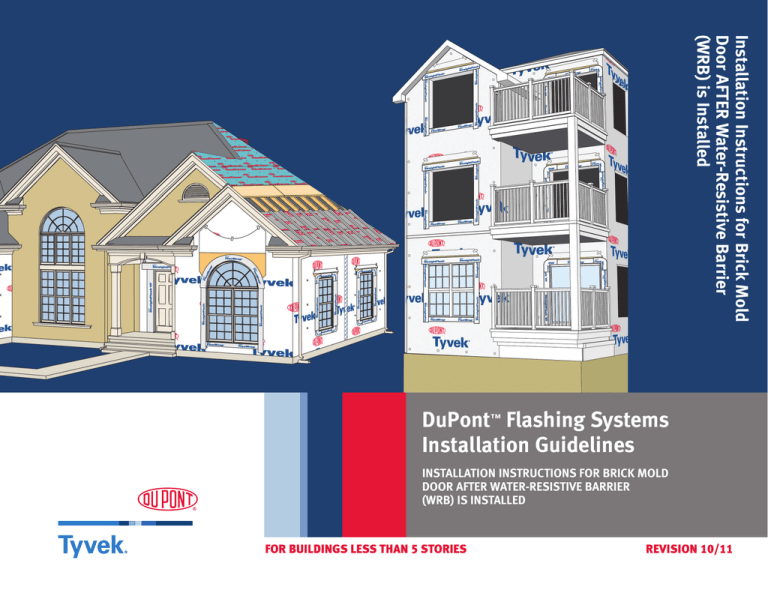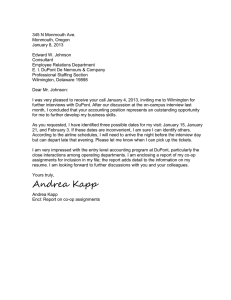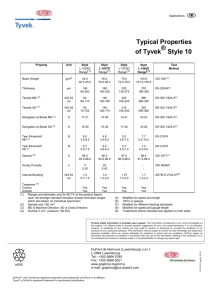
Installation Instructions for Brick Mold
Door AFTER Water-Resistive Barrier
(WRB) is Installed
DuPont™ Flashing Systems
Installation Guidelines
INSTALLATION INSTRUCTIONS FOR BRICK MOLD
DOOR AFTER WATER-RESISTIVE BARRIER
(WRB) IS INSTALLED
FOR BUILDINGS LESS THAN 5 STORIES
REVISION 10/11
DuPont™ Flashing Systems Installation Guidelines
Table of Contents
Applicable Products
Applicable Products........................................................................................................... 2
Necessary Materials.......................................................................................................... 2
Optional Materials............................................................................................................. 2
Recommended Primers..................................................................................................... 3
DuPont Recommended Low Expansion Foams................................................................ 3
DuPont Recommended Fasteners.................................................................................... 3
General Instructions.......................................................................................................... 3
Brick Mold Door................................................................................................................. 5
Flashing Products
PRODUCT
DIMENSIONSAREA
DuPont™ FlexWrap™ NF*
6 in x 75 ft
9 in x 75 ft
37.50 sq ft
56.20 sq ft
DuPont™ FlexWrap™*
9 in x 75 ft
9 in x 250 ft
56.2 sq ft
187.5 sq ft
DuPont™ StraightFlash™
4 in x 150 ft
9 in x 125 ft
50 sq ft
93.75 sq ft
DuPont™ StraightFlash™ VF
6 in x 125 ft
62.5 sq ft
DuPont Flashing Tape
4 in x 100 ft
6 in x 100 ft
9 in x 100 ft
33.33 sq ft
50.2 sq ft
75 sq ft
9 in x 6 in
9 in x 6 in
0.38 sq ft
0.38 sq ft
™
DuPont™ FlexWrap™ RW for Single Stud Application
DuPont™ FlexWrap™ RW for Double Stud Application
* These installation instructions are applicable to both DuPont™ FlexWrap™ and
FlexWrap™ NF which can be used interchangeably throughout the installation
guide. DuPont™ FlexWrap™ must be secured with recommended fasteners as
shown on page 4.
Necessary Materials
• DuPont™ Flashing
• DuPont™ Tyvek® Tape
• DuPont™ Residential Sealant, DuPont™ Commercial Sealant or recommended sealant
Optional Materials
• DuPont™ Tyvek® Wrap Caps or other recommended fasteners
• Brushes for surface preparation
• Backer rod
• J -roller
• Recommended primers
• “L” shaped back dam is a 3/4” corner guard (used on interior gypsum)
Copyright ©2011 E. I. du Pont de Nemours and Company. All Rights Reserved. Rev. 10/11
2
DuPont™ Flashing Systems Installation Guidelines
Recommended Primers*
General Instructions
MANUFACTURER
PRODUCT NAME
3M
Hi-Strength 90
Denso
Butyl Primer (spray or can)
* Apply per manufacturers’ guidelines. For non-DuPont products, DuPont assumes no liability in use of
recommended products; installers need to evaluate suitability of recommended products in their end-use
applications.
DuPont Recommended Low Expansion Foam
MANUFACTURER
DuPont
PRODUCT NAME
DuPont™ Window & Door Foam
DuPont Recommended Fasteners*
MANUFACTURER
PRODUCT NAME
For buildings less than 5 stories
For performance requirements exceeding ASTM E1677, 65 mph equivalent structural
load and 15 mph equivalent wind-driven rain water infiltration for buildings less than 5
stories, or for installations that specify a window/door design rating of DP45 or greater,
it is recommended to install a high pressure skirt to help prevent water intrusion at the
sill or threshold and follow the DuPont™ Flashing Systems Commercial Installation
Guidelines.
DuPont™ Flashing Systems products should be installed on clean, dry surfaces that are
free of frost. Wipe surfaces to remove moisture, dirt, grease and other debris that could
interfere with adhesion.
When cutting the Weather Resistant Barrier (WRB) to prepare the opening, remove an
additional 1” strip of the WRB head flap to allow more room for the tape adhesive to
seal the head flashing.
DuPontDuPont Tyvek Wrap Cap screws
Apply pressure along entire surface of flashing for a good bond using a J-roller or firm
hand pressure.
DuPontDuPont™ Tyvek® Wrap Cap staples (for Stinger™ or Crossfire® cap stapler)**
Remove all wrinkles and bubbles that may allow for water intrusion by smoothing
surface and repositioning as necessary.
DuPontDuPont™ Tyvek® Wrap Cap nails
™
®
DuPont™ Tyvek® Wrap Cap with alternate screws
1.0 inch minimum crown staples**
* Apply per manufacturers’ guidelines. For non DuPont products, DuPont assumes no liability for
use of recommended products; installers need to evaluate suitability of recommended products in
their end-use applications.
** Except when installing DuPont™ Tyvek® WRBs over foam and other non-nail-base sheathings.
Warranty
Please see DuPont Weatherization Products Limited Warranty for buildings less than
5 stories at www.Weatherization.Tyvek.com.
When flashing the sill area for windows and doors, DuPont recommends the use of 6”
wide DuPont™ Flexwrap™ NF for 2”x 4” framing and 9” wide DuPont™ Flexwrap™ NF for
2” x 6” framing. As an option, if a rigid back dam is desired, cut the corner back dam
the length of the sill and nail into place on the interior edge of the sill prior to installation
of DuPont™ Flexwrap™ NF. Then install DuPont™ Flexwrap™ NF over sill and corner guard
back dam. If using 6” DuPont™ FlexWrap™ NF with optional rigid back dam, seal ends of
corner guard with DuPont™ Residential Sealant, DuPont™ Commercial Sealant or
recommended sealant.
Door and window rough sill framing must be level or slightly sloped to the exterior to
ensure proper drainage to the exterior. This best practice ensures continuous support
with positive slope to the exterior.
DuPont™ Residential Sealant and DuPont™ Commercial Sealant should be tooled flat to
allow the natural curing process to create a concave joint.
Copyright ©2011 E. I. du Pont de Nemours and Company. All Rights Reserved. Rev. 10/11
3
DuPont™ Flashing Systems Installation Guidelines
Please contact your local DuPont™ Tyvek® Specialist for additional information and
installation support.
DO NOT STRETCH DuPont™ FlexWrap™ NF when installing along the length of sills or
jambs. DuPont™ FlexWrap™ NF is only intended to be extended when covering corners
or curved sections.
These installation instructions are applicable to both DuPont™ FlexWrap™ NF and
FlexWrap™ which can be used interchangeably throughout the installation guide.
However, DuPont™ FlexWrap™ must be secured with recommended fasteners as
shown in the illustration at right.
DuPont Flashing Systems products perform best when installed at temperatures above
25°F (–4°C).
DuPont™ Flashing Systems products should not be installed over cap fasteners.
Priming is generally not required for adhering DuPont™ Flashing Systems products to
most common building materials. However, adverse weather conditions or cold
temperatures may require use of a primer to promote adhesion. Additionally, concrete,
masonry, and glass mat gypsum sheathing require the use of approved primers. For
primer recommendations, see page 3.
For additional guidelines please call 1-800-44-Tyvek (800-448-9835), visit our website at
www.Weatherization.Tyvek.com, or consult your local DuPont™ Tyvek® Specialist.
Copyright ©2011 E. I. du Pont de Nemours and Company. All Rights Reserved. Rev. 10/11
4
DuPont™ Flashing Systems Installation Guidelines
Brick Mold Door AFTER Water-Resistive Barrier (WRB) Is Installed
This installation guide is intended for doors installed above grade and/or with wood floor construction.
Method applies to the following products:
• DuPont™ StraightFlash™, DuPont™ StraightFlash™ VF, DuPont™ FlexWrap™ NF, and DuPont™ Flashing Tape
STEP 1
Prepare the DuPont™ Tyvek® WRB for door installation:
A. Make an “I-Cut” (Standard I-Cut) in the DuPont™ Tyvek® WRB. For an “I-Cut”, begin with a horizontal cut across the bottom and
the top of the door frame. From the center, cut straight down to the sill.
B. Cut two 45 degree slits a minimum of 8” extending from the corner of the door head, up and away from door opening. This will
create a flap above the rough opening to expose sheathing or framing members to allow head flashing installation (see step 8).
NOTE: Some doors and flashing widths may require longer slits.
C.Flip head flap up and temporarily secure with DuPont™ Tyvek® Tape.
D.Fold side flaps into rough opening, and secure to inside wall framing. Cut off excess flaps if desired.
8“ Minimum
B
8“
Minimum
C
A
D
D
Interior
Copyright ©2011 E. I. du Pont de Nemours and Company. All Rights Reserved. Rev. 10/11
5
DuPont™ Flashing Systems Installation Guidelines
STEP 2
Preparation of sill flashing:
6-inch for 2x4-inch studs
9-inch for 2x6-inch studs
A. Cut DuPont™ FlexWrap™ NF at least 12” LONGER than width of the sill (S).
B. 9” DuPont™ FlexWrap™ NF has perforated release paper to help with the formation
of the back dam. To ensure that the perforation tears cleanly, fold the perforation
180° and crease the flashing.
Front
Overlap
Scored
Release
Paper
C. Remove the two widest pieces of release paper leaving the narrowest release paper
on the flashing. When the finished floor is applied, the release paper can be removed
and the back dam can be completed.
A
Back
Break Scored
Release Paper
B
A
(S)
Sill Width
+ 12 inches
Copyright ©2011 E. I. du Pont de Nemours and Company. All Rights Reserved. Rev. 10/11
Peel Off
2-pieces
of Release
Paper
C
6
DuPont™ Flashing Systems Installation Guidelines
STEP 3 (OPTIONAL BACK DAM)
Install the sill flashing as indicated leaving the 1” of 9” DuPont™ FlexWrap™ NF with release paper extending it past the door threshold
on the inside. When the 1” of release paper is removed, 3/4”of flashing will be available to form the back dam.
Option 2: Some flooring cannot accomodate a back dam. In that case fold the 1” back dam on top of the 9” DuPont™ FlexWrap™ NF in
the sill. Door will be installed on top of 1” fold to create a back dam.
EXTERIOR
INTERIOR
Door
Door
Threshold
Transition
Threshold
Flooring
Optional
3
1
6“
5
No Gap in Corner
Door Jamb
2
DuPont™
FlexWrap™ NF
4
WRONG
DO NOT STRETCH
DuPont™
StraightFlash™
Sill
CORRECT
High Pressure
Skirt (See Step
5 Optional)
DuPont™
FlexWrap™
NF
DuPont™
Tyvek® WRB
Sub Floor
Corner
Guard
(Optional)
Sheathing
SIDE VIEW DETAIL
FRONT VIEW CORNER DETAIL
Copyright ©2011 E. I. du Pont de Nemours and Company. All Rights Reserved. Rev. 10/11
7
DuPont™ Flashing Systems Installation Guidelines
STEP 4
Fan DuPont™ FlexWrap™ NF at bottom corners onto face of wall. Coverage of DuPont™
FlexWrap™ NF should be 2” to 3” onto the face of the wall.
Copyright ©2011 E. I. du Pont de Nemours and Company. All Rights Reserved. Rev. 10/11
8
DuPont™ Flashing Systems Installation Guidelines
STEP 5 (OPTIONAL)
For extreme weather conditions, performance requirements exceeding ASTM E1677, or window/door design ratings of DP45 or
greater, see General Instructions.
A. Create the high pressure skirt by cutting a piece of DuPont™ Tyvek® WRB 1” wider than the width of door threshold opening and
approximately 10” in height.
B. Cut a 4” piece of DuPont™ StraightFlash™ VF or DuPont™ StraightFlash™ to the same width as the skirt. Remove two pieces of
release paper and adhere to the DuPont™ Tyvek® WRB.
C. Remove the last pieces of release paper and attach the skirt to the underside of the door threshold. This skirt may be made with
either DuPont™ StraightFlash™ VF or DuPont™ StraightFlash™.
DuPont™
StraightFlash™ VF
B
A
10”
Copyright ©2011 E. I. du Pont de Nemours and Company. All Rights Reserved. Rev. 10/11
C
Butyl
Adhesive
Peel Off
Release Paper
and attach
to underside
of door threshold
9
DuPont™ Flashing Systems Installation Guidelines
FOR BRICK MOLD
STEP 6
A. Prepare head flashing by cutting a piece of DuPont™ StraightFlash™ VF at least twelve (12) inches LONGER than the head length.
B. Break the scored release paper on one edge of the head flashing by folding it back and forth upon itself.
C. Center the DuPont™ StraightFlash™ VF along the length of the door head and position so that it contacts the door frame and interior
side of the brick mold or flange. Remove the outer release paper and adhere the flashing to the door frame. Use the inner release
paper to form a tight seal in the corner.
D.Remove the inner release paper strip and adhere the flashing to the back of the brick mold or flange.
E. Beginning at the junction of the jamb and head, and away from the corner, cut the DuPont™ StraightFlash™ VF at a 45° angle.
F. Fold the newly created flashing flap down flat against the brick mold or flange.
G.Fold remaining head flashing flaps down onto the jamb frame.
A
D
E
A
C
A
F
G
Brick Mold
Scored
Release
Paper
Door
Butyl
VIEW A-A
Door
Interior
Door
Interior
Copyright ©2011 E. I. du Pont de Nemours and Company. All Rights Reserved. Rev. 10/11
Door
Interior
Door
Interior
10
DuPont™ Flashing Systems Installation Guidelines
STEP 7
A. Prepare jamb flashing by cutting a piece of DuPont™ StraightFlash™ VF at least six (6)
inches LONGER than the jamb.
B. Break the scored release paper on one side of the jamb flashing by folding it back
and forth upon itself.
C Position so that the DuPont™ StraightFlash™ VF contacts the door frame and interior
side of the brick mold. Ensure that the jamb flashing is positioned 1-1/2 inch below
the top edge of the head flashing. Jamb flashing adhesive must come in contact
with head flashing adhesive by one inch.
STEP 8
A. Beginning at the junction of the jamb and head and beginning at the junction of the
jamb and sill, and away from the corner, cut the DuPont™ StraightFlash™ VF along
both corners at a 45° angle.
B. Fold newly created flaps down flat against the head flashing.
C.Fold newly created flaps down onto the head and sill of door frame.
1-1/2“
D.Remove the outer release paper and adhere the flashing to the door frame. Use the
inner release paper to form a tight seal in the corner.
C
E. Remove the inner release paper and adhere the flashing to the back of the brick mold.
F. Repeat on for opposite jamb.
C
B
A
Make sure the
adhesive on these
pieces will
overlap.
C
E
C
1-1/2”
Door
Interior
Door
Interior
Door
Interior
A
Door
Interior
Door
Interior
Door
Interior
D
Copyright ©2011 E. I. du Pont de Nemours and Company. All Rights Reserved. Rev. 10/11
11
DuPont™ Flashing Systems Installation Guidelines
STEP 9
A. Install door according to manufacturer’s installation instructions.
B. Remove the remaining release paper from the DuPont™ StraightFlash™ VF jamb flashing
and press firmly to adhere it to the DuPont™ Tyvek® WRB.
C. Remove the release paper at the head and adhere it to the wall surface.
D.OPTIONAL: Cover exposed butyl with DuPont™ StraightFlash™ or DuPont™ Flashing Tape.
EXTERIOR
INTERIOR
Door
C
Door
Threshold
Transition
Threshold
Flooring
Optional
DuPont™
StraightFlash™
High Pressure
Skirt (See Step
5 Optional)
DuPont™
FlexWrap™
NF
DuPont™
Tyvek® WRB
Sub Floor
Corner
Guard
(Optional)
Sheathing
B
SIDE VIEW DETAIL
Copyright ©2011 E. I. du Pont de Nemours and Company. All Rights Reserved. Rev. 10/11
12
DuPont™ Flashing Systems Installation Guidelines
STEP 10 (OPTIONAL) - HIGH PRESSURE SKIRT (Completing installation of flashing for brick mold door)
For extreme weather conditions, performance requirements exceeding ASTM E1677, or window/door design ratings of DP45 or
greater, see General Instructions.
A. Create the high pressure skirt by cutting a piece of DuPont™ Tyvek® WRB 1” wider than the width of door opening and
approximately 10” in height.
B. Cut a piece of DuPont™ StraightFlash™ VF to the same width of skirt. Remove release paper from one side of DuPont™
StraightFlash™ VF and adhere to DuPont™ Tyvek® WRB. The skirt may be made with either DuPont™ StraightFlash™ VF or DuPont™
StraightFlash™.
C. Remove the release paper from the other side of DuPont™ StraightFlash™ VF and adhere the butyl adhesive at the sill skirt to the
underside of the door threshold behind the jamb flashing.
D.Secure edges of the optional skirt with
two 4” pieces of DuPont™
StraightFlash™.
E. Tape the bottom of the optional skirt to
allow for drainage and to minimize
wind damage during construction.
F. If sealant is applied to the threshold,
ensure that there are at least two (2) 2”
gaps in the sealant bead to allow for
drainage for every 4’ of door using
DuPont™ Residential Sealant, DuPont™
Commercial Sealant or recommended
sealant.
DuPont™
StraightFlash™ VF
B
A
10”
C
Butyl
Adhesive
Peel Off
Release Paper
and attach
to underside
of door
F
D
E
D
Copyright ©2011 E. I. du Pont de Nemours and Company. All Rights Reserved. Rev. 10/11
Optional
High Pressure
Skirt
13
DuPont™ Flashing Systems Installation Guidelines
STEP 11 (RECOMMENDED BEST PRACTICE)
A. OPTIONAL: Cut a piece of metal or vinyl drip cap 1/8” LONGER than the width of
the door and bend down edges. Place a bead of DuPont™ Residential Sealant,
DuPont™ Commercial Sealant or recommended sealant on the rear side. Install the
drip cap tight against the door head and cover the top edge with DuPont™
StraightFlash™ or DuPont™ Flashing Tape.
B. Flip down upper flap of the DuPont™ Tyvek® WRB so it lays flat across head flashing.
C. Tape seams as shown. DO NOT TAPE at bottom of door. At the head, continuous tape
seams as shown with DuPont™ Tyvek® Tape; if an air barrier is not required or if
additional drainage is desired. Skip-taping at the head is acceptable.
D.Tape down diagonal seams of DuPont™ Tyvek® WRB.
STEP 12
Final Step
A.When the interior flooring is ready to install, remove release paper and use Folding
Option One or Two to form back dam.
B. Install DuPont™ Residential Sealant, DuPont™ Commercial Sealant or recommended
sealant (and backer rod as necessary) around the door opening at the interior. It is also
acceptable to use DuPont™ Window & Door Foam or recommended foam. The seal
created by the sealant (and backer rod as necessary) or foam will also serve as a back
dam. DuPont™ Residential Sealant or DuPont™ Commercial Sealant should be tooled
flat to allow the natural curing process to create a concave shape. Be sure that the
sealant penetrates the grooves of the DuPont™ FlexWrap™ NF around the sill.
NOTE: Installations that specify a window/door design rating of DP45 or greater require
extra precautions. See General Instructions for performance requirements exceeding
this design rating.
A
D
B
C
A
Folding Option One
Folding Option Two
OR
Fold Out and Up
Fold In and Up
Fastening Option One
Fastening Option Two
OR
Staples
Copyright ©2011 E. I. du Pont de Nemours and Company. All Rights Reserved. Rev. 10/11
Tape
14
Technical Specifications
Note
DuPont™ Tyvek® WRBs used in construction products are made from 100% flash spunbonded high
density polyethylene fibers which have been bonded together by heat and pressure, without
binders or fillers, into a tough, durable sheet structure. Additives have been incorporated into the
polyethylene to provide ultraviolet light resistance. DuPont requires that DuPont™ Tyvek®
CommercialWrap® and CommercialWrap® D be covered within 9 months (270 days) of installation
and that all other DuPont™ Tyvek® WRB’s be covered within 4 months (120 days) of installation.
When installed in conjunction with other building materials, DuPont™ Flashing Systems products
must be properly shingled with these materials such that water is diverted to the exterior of the
wall system. DuPont™ Tyvek® products are air and water barriers and not the primary water barrier.
The outer facade is the primary barrier. You must follow facade manufacturer’s installation and
maintenance requirements for all facade systems in order to maintain water holdout properties and
ensure performance of DuPont™ Tyvek® products. Use of additives, coatings or cleansers on or in the
facade system may impact the performance of DuPont™ Tyvek® water-resistive barriers. DuPont™
Tyvek® Weatherization Systems products are to be used as outlined in this installation guideline.
DuPont Flashing Systems products should only be used to seal penetrations and flash openings in
houses or buildings. DuPont™ Flashing Systems products are not to be used in roofing applications.
For superior protection against bulk water penetration, DuPont suggests a system combining a
quality exterior facade, a good secondary weather barrier and exterior sheathing, high quality
windows and doors, and appropriate flashing materials paying attention to proper installation of
each component. In a system where no exterior sheathing is used and DuPont™ Tyvek® WRB is
installed directly over the wall studs, exterior facade materials should be selected to ensure
maximum protection against water intrusion. Careful workmanship and proper installation of each
component is very important.
DuPont™ Flashing Systems products are made from a synthetic rubber adhesive and a laminate of
polyethylene film, polypropelene film, elastic fiber, synthetic rubber adhesive, polyurethane
adhesive, and a top sheet of flash spunbonded high density polyethylene fibers or polypropelene
film. Additives have been incorporated into these materials to provide ultraviolet light resistance.
DuPont requires that DuPont™ Flashing Systems products be covered within four months (120
days) of installation.
Warning
DuPont™ Tyvek® Water-Resistive Barriers are slippery and should not be used in any
application where it will be walked on. In addition, because they are slippery, DuPont
recommends using kickjacks or scaffolding for exterior work above the first floor. If ladders
must be used, extra caution must be taken to use them safely by following the requirements
set forth in ANSI Standards 14.1, 14.2 and 14.5 for ladders made of wood, aluminum, and
fiberglass, respectively. DuPont™ Tyvek® products are combustible and should be protected
from a flame and other high heat sources. DuPont™ Tyvek® products will melt at 275°F (135°C);
if the temperature of DuPont™ Tyvek® products reaches 750°F (400°C), it will burn and the fire
may spread and fall away from the point of ignition. For more information, call
1-800-44-Tyvek.
DuPont™ Flashing Systems products and their release paper are slippery and should not be
walked on. Remove release paper from work area immediately. DuPont™ Flashing Systems
products will melt at temperatures greater than 250°F (121°C). DuPont™ Flashing Systems
products are combustible and should be protected from flames and other high heat sources.
DuPont™ Flashing Systems products will not support combustion if the heat source is
removed. However, if burning occurs, ignited droplets may fall away from the point of
ignition. For more information, call 1-800-44-Tyvek.
DuPont believes this information to be reliable and accurate. This information may be subject to
revision as additional experience and knowledge is gained. It is the user’s responsibility to
determine the proper construction materials needed on each project.
For complete warranty information, please visit www.Weatherization.Tyvek.com or call
1-800-44-Tyvek.
This information is not intended to be used by others for advertising, promotion or other publication
for commercial purposes.
For more information about DuPont Weatherization
Systems, please call 1-800-44-Tyvek or visit us at
www.weatherization.tyvek.com
DuPont™ Residential Sealant and DuPont™ Commercial Sealant are irritating to skin, eyes, and
respiratory tract. For proper usage, follow directions stated on the product label. For health
information, refer to the Material Safety Data Sheet or call Chemtrec at 1-800-424-9300.
Copyright © 2011 E. I. du Pont de Nemours and Company. All rights reserved. The DuPont Oval Logo, DuPont™, Tyvek®, CommercialWrap®, HomeWarp®, FlexWrap™, and StraightFlash™ are registered trademarks or trademarks of DuPont or its affiliates. All rights reserved. K-25732 10/11





